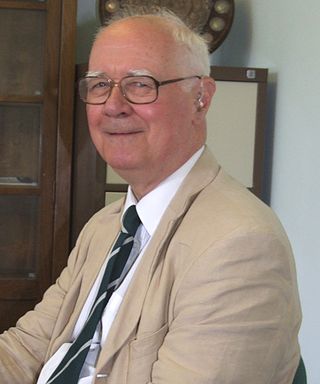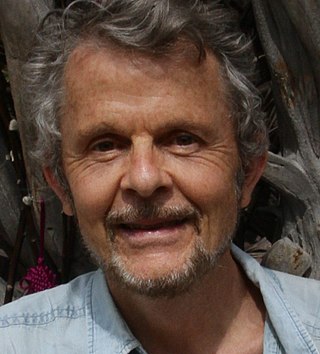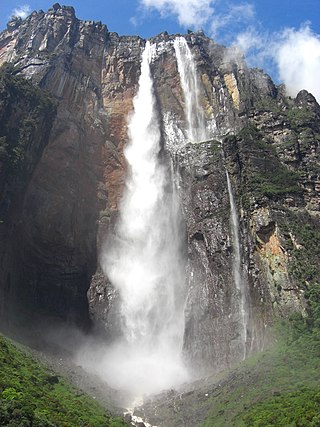Related Research Articles

Monism attributes oneness or singleness to a concept, e.g. existence. Various kinds of monism can be distinguished:

Pantheism is the belief that reality, the universe and the cosmos are identical to divinity and a supreme being or entity, pointing to the universe as being an immanent creator deity who is still expanding and creating, which has existed since the beginning of time, or that all things compose an all-encompassing, immanent god or goddess and regards the universe as a manifestation of a deity. This includes all astronomical objects being viewed as part of a sole deity.
Panentheism is the belief that the divine intersects every part of the universe and also extends beyond space and time. The term was coined by the German philosopher Karl Krause in 1828 to distinguish the ideas of Georg Wilhelm Friedrich Hegel (1770–1831) and Friedrich Wilhelm Joseph Schelling (1775–1854) about the relation of God and the universe from the supposed pantheism of Baruch Spinoza, after reviewing Hindu scriptures. Unlike pantheism, which holds that the divine and the universe are identical, panentheism maintains an ontological distinction between the divine and the non-divine and the significance of both.

Theism is broadly defined as the belief in the existence of at least one deity. In common parlance, or when contrasted with deism, the term often describes the classical conception of God that is found in monotheism — or gods found in polytheistic religions — a belief in God or in gods without the rejection of revelation as is characteristic of deism. Gnosticism is the belief in personal spiritual knowledge.

John Charlton Polkinghorne was an English theoretical physicist, theologian, and Anglican priest. A prominent and leading voice explaining the relationship between science and religion, he was professor of mathematical physics at the University of Cambridge from 1968 to 1979, when he resigned his chair to study for the priesthood, becoming an ordained Anglican priest in 1982. He served as the president of Queens' College, Cambridge, from 1988 until 1996.
The Universal Pantheist Society is one of the world's first official organizations dedicated to the promotion and understanding of modern pantheism. The Society does not require its members to hold to any particular creed about Pantheism and recognizes that there are a variety of beliefs that fall under the title pantheism. The Society encourages individuals in finding ways of spiritual practice in keeping with the general spirit of pantheism. Its motto is We seek renewed reverence for the Earth and a vision of Nature as the ultimate context for human existence...
Classical Pantheism, as defined by Charles Hartshorne in 1953, is the theological deterministic philosophies of pantheists such as Baruch Spinoza and the Stoics. Hartshorne sought to distinguish panentheism, which rejects determinism, from deterministic pantheism.
Naturalistic pantheism, also known as scientific pantheism, is a form of pantheism. It has been used in various ways such as to relate God or divinity with concrete things, determinism, or the substance of the universe. God, from these perspectives, is seen as the aggregate of all unified natural phenomena. The phrase has often been associated with the philosophy of Baruch Spinoza, although academics differ on how it is used.
Generally speaking, Buddhism is a religion that does not include the belief in a monotheistic creator deity. As such, it has often been described as either (non-materialistic) atheism or as nontheism, though these descriptions have been challenged by other scholars, since some forms of Buddhism do posit different kinds of transcendent, unborn, and unconditioned ultimate realities.

Religious naturalism combines a naturalist worldview with ideals, perceptions, traditions, and values that have been traditionally associated with many religions or religious institutions. "Religious naturalism is a perspective that finds religious meaning in the natural world and rejects the notion of a supernatural realm." The term religious in this context is construed in general terms, separate from the traditions, customs, or beliefs of any one of the established religions.
Natural religion most frequently means the "religion of nature", in which God, the soul, spirits, and all objects of the supernatural are considered as part of nature and not separate from it. Conversely, it is also used in philosophy to describe some aspects of religion that are said to be knowable apart from divine revelation through logic and reason alone, for example, the existence of the unmoved Mover, the first cause of the universe.

Paul Harrison is an environmental writer, author of books and reports on environment and development, and editor of major United Nations reports. He is the founder and president of the World Pantheist Movement.
Theopanism was first used as a technical term by the Jesuits in elucidating Hinduism.
[O]ne may distinguish pantheism, which imagines the world as an absolute being, from theopanism, which conceives of God as the true spiritual reality from which everything emanates: "God becomes everything", necessarily, incessantly, without beginning and without end. Theopanism is the most common way in which Hindu philosophy conceives God and the world.

In monotheistic thought, God is usually viewed as the supreme being, creator, and principal object of faith. In non-monotheistic thought, a god is "a spirit or being believed to control some part of the universe or life and often worshipped for doing so, or something that represents this spirit or being".

Spiritual naturalism, or naturalistic spirituality combines a naturalist approach to spiritual ways of looking at the world. Spiritual naturalism may have first been proposed by Joris-Karl Huysmans in 1895 in his book En Route.
Coming into prominence as a writer during the 1870s, Huysmans quickly established himself among a rising group of writers, the so-called Naturalist school, of whom Émile Zola was the acknowledged head...With Là-bas (1891), a novel which reflected the aesthetics of the spiritualist revival and the contemporary interest in the occult, Huysmans formulated for the first time an aesthetic theory which sought to synthesize the mundane and the transcendent: "spiritual Naturalism".
Pandeism, is a theological doctrine that combines aspects of pantheism with aspects of deism. Unlike classical deism, which holds that God does not interfere with the universe after its creation, pandeism holds that a creator deity became the universe and ceased to exist as a separate entity. Pandeism purports to explain why God would create a universe and then appear to abandon it, and seeks to explain the origin and purpose of the universe.
The belief that God became the Universe is a theological doctrine that has been developed several times historically, and holds that the creator of the universe actually became the universe. Historically, for versions of this theory where God has ceased to exist or to act as a separate and conscious entity, some have used the term pandeism, which combines aspects of pantheism and deism, to refer to such a theology. A similar concept is panentheism, which has the creator become the universe only in part, but remain in some other part transcendent to it, as well. Hindu texts like the Mandukya Upanishad speak of the undivided one which became the universe.

In philosophy, naturalism is the idea or belief that only natural laws and forces operate in the universe.
A number of Christian writers have examined the concept of pandeism, and these have generally found it to be inconsistent with core principles of Christianity. The Roman Catholic Church, for example, condemned the Periphyseon of John Scotus Eriugena, later identified by physicist and philosopher Max Bernhard Weinstein as presenting a pandeistic theology, as appearing to obscure the separation of God and creation. The Church similarly condemned elements of the thought of Giordano Bruno which Weinstein and others determined to be pandeistic.
References
- ↑ "World Pantheist Movement". Oxford Reference. Retrieved 20 August 2021.
- ↑ Herrmann, Robert (2009). Expanding Humanitys Vision Of God. Templeton Press. p. 251. ISBN 978-1599470979 . Retrieved 20 August 2021.
- ↑ Duck, Michael John; Petry, Michael (2016). Goethe's "Exposure Of Newton's Theory": A Polemic On Newton's Theory Of Light And Colour. Templeton Press. p. xxxix. ISBN 978-1783268498 . Retrieved 20 August 2021.
- ↑ Stone, Jerome A. (2008). Religious Naturalism Today – The Rebirth of a Forgotten Alternative. State University of New York Press. pp. 10–11. ISBN 978-0791475379 . Retrieved 20 August 2021.
- ↑ Harrison, Paul (20 May 1999). "Theological Notes: A promising time for pantheism". The Independent. Retrieved 20 August 2021.